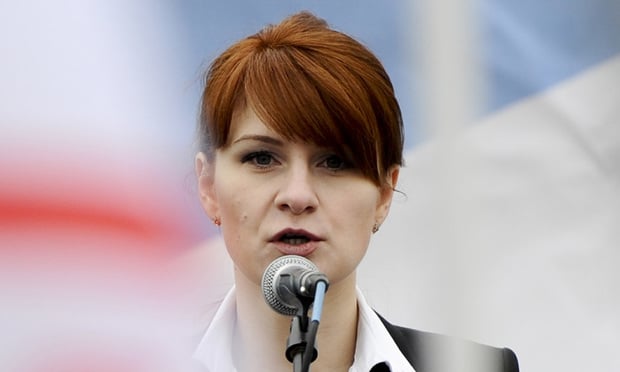Maria Butina, Accused Russian Agent, Cooperating With Prosecutors
Butina admitted she worked at the behest of a Russian official as she sought to infiltrate Republican political circles.
December 13, 2018 at 12:30 PM
4 minute read
 Maria Butina. Photo: The Associated Press
Maria Butina. Photo: The Associated Press
Marina Butina, the Russian woman accused of cozying up to conservatives in the lead-up to the 2016 U.S. election, pleaded guilty Thursday to conspiring to work as a Russian agent, as details of her cooperation were unveiled in Washington, D.C., federal court.
Butina admitted to conspiring to work in the U.S. on behalf of the Russian government without notifying the Justice Department. She, along with an American citizen, worked at the behest of a Russian official—believed to be Alexander Torshin, the Russian central bank's deputy governor—as she sought to infiltrate and influence conservative political circles.
During that time, she worked alongside and was romantically involved with an American man believed to be Paul Erickson, a Republican operative with ties to the National Rifle Association. Neither Torshin, Erickson nor the NRA have been identified by name in court papers or proceedings.
Butina will cooperate with federal authorities as part of her guilty plea, according to her attorney, Robert Driscoll of McGlinchey Stafford.
The government will drop a second count of acting as a foreign agent. The case was brought by prosecutors from the U.S. Attorney's Office in Washington, D.C., and the Justice Department's National Security Division.
Thursday's plea caps the monthslong legal saga for Butina, who was arrested and charged in July on suspicions that she operated in the U.S. as a Russian spy. Butina, a gun rights activist in Russia, was living in Washington, D.C., while attending graduate school at American University. She pleaded not guilty in July.
Court papers on Thursday detailed Butina's efforts to ingratiate herself with American political conservatives, describing how she sought to build “unofficial lines of communication” with Erickson's help, and under Torshin's direction.
In March 2015, Butina drafted a proposal known as the “Description of the Diplomacy Project,” where she pitched the idea of fashioning unofficial ties with conservatives as part of a broader effort to sway American opinion toward Russian interests. Erickson helped Butina by lending advice on the draft, and giving information about prominent political figures and a “forecast of the upcoming presidential election.”
Butina sent the proposal to Torshin and others, requesting $125,000 from a Russian billionaire to attend conferences outlined in the proposal, and to meet with Russians to determine what Russia's interests were in relation to the U.S. Torshin, according to court papers, told Butina her efforts “would be supported, at least in part.”
As part of those efforts, Butina attended a National Rifle Association convention in April 2015, where she was introduced to influential Republicans. Butina later that year invited powerful NRA members to Moscow, and in December 2015, they met with high-level Russian government officials in a meeting Torshin arranged.
Court papers show that Butina also helped a “wealthy and well-connected U.S. person” set up a series of “friendship dinners.” During those dinners, Butina met with American individuals “with political capital,” taking in their views about U.S.-Russian relations and studying their responses to “adjust her pitch accordingly.”
“Butina used these 'friendship dinners' to cultivate lines of communication with individuals she believed would have the ear of the next U.S. presidential administration,” court documents said.
Butina also helped Torshin organize a Russian delegation that would later attend the 2017 National Prayer Breakfast in Washington, D.C. She emailed the list of invitees to Erickson, touting that the people were “hand-picked” by her and Torshin, and that they were “coming to establish a back channel of communication.”
Prosecutors on Thursday did not resurface some of the more salacious allegations they've made against Butina. Court filings did not include prosecutors' earlier and retracted accusation that Butina sent messages offering sex for a job, an allegation that spilled into the press and drew the admonishment of U.S. District Judge Tanya Chutkan of the District of Columbia, who said it was “apparent on their face” that Butina's statements were jokes.
Depending on the outcome of Butina's cooperation, she is expected to face up to six months in prison. Butina, who was detained in a Washington, D.C., jail after being described as a flight risk in July, could also face deportation after finishing any possible prison sentence.
Chutkan did not set a sentencing date Thursday. A status hearing was set for Feb. 12.
This content has been archived. It is available through our partners, LexisNexis® and Bloomberg Law.
To view this content, please continue to their sites.
Not a Lexis Subscriber?
Subscribe Now
Not a Bloomberg Law Subscriber?
Subscribe Now
NOT FOR REPRINT
© 2025 ALM Global, LLC, All Rights Reserved. Request academic re-use from www.copyright.com. All other uses, submit a request to [email protected]. For more information visit Asset & Logo Licensing.
You Might Like
View All
‘Diminishing Returns’: Is the Superstar Supreme Court Lawyer Overvalued?

DC Lawsuits Seek to Prevent Mass Firings and Public Naming of FBI Agents
3 minute read
Trending Stories
- 1SEC Sued for Failing to Reveal Records Involving Simpson Thacher Attorney
- 2Lawsuit accuses University of California of racial discrimination in admissions
- 3Data Breaches in UK Legal Sector Surge, According to ICO Data
- 4PayPal Faces New Round of Claims; This Time Alleging Its 'Honey' Browser Extension Cheated Consumers
- 5Fired NLRB Member Seeks Reinstatement, Challenges President's Removal Power
Who Got The Work
J. Brugh Lower of Gibbons has entered an appearance for industrial equipment supplier Devco Corporation in a pending trademark infringement lawsuit. The suit, accusing the defendant of selling knock-off Graco products, was filed Dec. 18 in New Jersey District Court by Rivkin Radler on behalf of Graco Inc. and Graco Minnesota. The case, assigned to U.S. District Judge Zahid N. Quraishi, is 3:24-cv-11294, Graco Inc. et al v. Devco Corporation.
Who Got The Work
Rebecca Maller-Stein and Kent A. Yalowitz of Arnold & Porter Kaye Scholer have entered their appearances for Hanaco Venture Capital and its executives, Lior Prosor and David Frankel, in a pending securities lawsuit. The action, filed on Dec. 24 in New York Southern District Court by Zell, Aron & Co. on behalf of Goldeneye Advisors, accuses the defendants of negligently and fraudulently managing the plaintiff's $1 million investment. The case, assigned to U.S. District Judge Vernon S. Broderick, is 1:24-cv-09918, Goldeneye Advisors, LLC v. Hanaco Venture Capital, Ltd. et al.
Who Got The Work
Attorneys from A&O Shearman has stepped in as defense counsel for Toronto-Dominion Bank and other defendants in a pending securities class action. The suit, filed Dec. 11 in New York Southern District Court by Bleichmar Fonti & Auld, accuses the defendants of concealing the bank's 'pervasive' deficiencies in regards to its compliance with the Bank Secrecy Act and the quality of its anti-money laundering controls. The case, assigned to U.S. District Judge Arun Subramanian, is 1:24-cv-09445, Gonzalez v. The Toronto-Dominion Bank et al.
Who Got The Work
Crown Castle International, a Pennsylvania company providing shared communications infrastructure, has turned to Luke D. Wolf of Gordon Rees Scully Mansukhani to fend off a pending breach-of-contract lawsuit. The court action, filed Nov. 25 in Michigan Eastern District Court by Hooper Hathaway PC on behalf of The Town Residences LLC, accuses Crown Castle of failing to transfer approximately $30,000 in utility payments from T-Mobile in breach of a roof-top lease and assignment agreement. The case, assigned to U.S. District Judge Susan K. Declercq, is 2:24-cv-13131, The Town Residences LLC v. T-Mobile US, Inc. et al.
Who Got The Work
Wilfred P. Coronato and Daniel M. Schwartz of McCarter & English have stepped in as defense counsel to Electrolux Home Products Inc. in a pending product liability lawsuit. The court action, filed Nov. 26 in New York Eastern District Court by Poulos Lopiccolo PC and Nagel Rice LLP on behalf of David Stern, alleges that the defendant's refrigerators’ drawers and shelving repeatedly break and fall apart within months after purchase. The case, assigned to U.S. District Judge Joan M. Azrack, is 2:24-cv-08204, Stern v. Electrolux Home Products, Inc.
Featured Firms
Law Offices of Gary Martin Hays & Associates, P.C.
(470) 294-1674
Law Offices of Mark E. Salomone
(857) 444-6468
Smith & Hassler
(713) 739-1250









